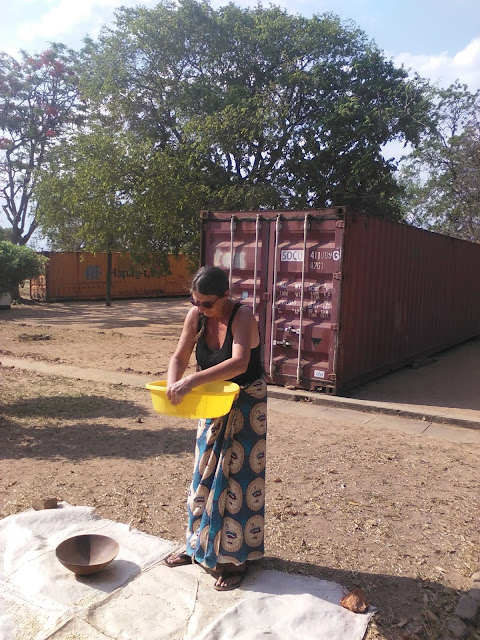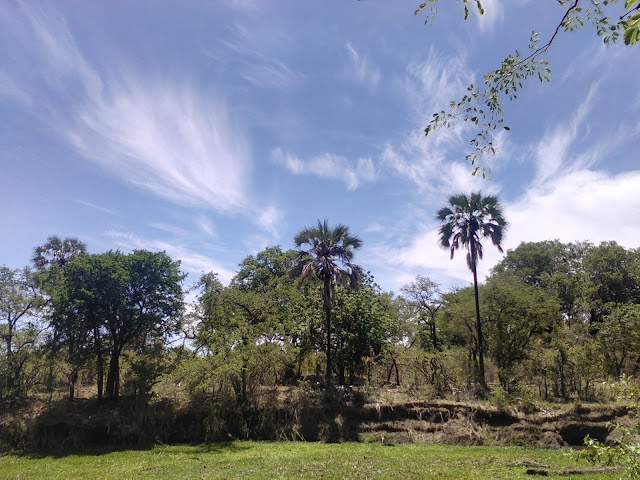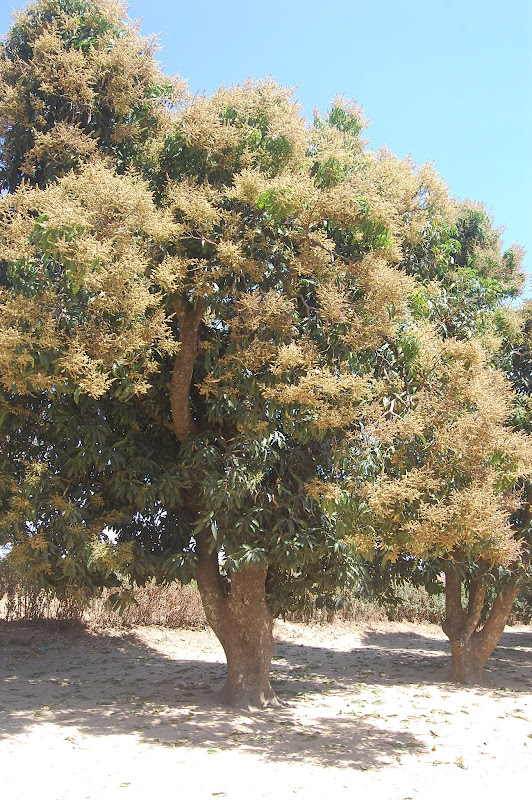In November last year, our friend Jo visited us from the UK. The following are some of her thoughts and pictures of her visit:
Arriving in Zambia, on October 31st, was a
surreal experience. Coming from an increasingly dark and chilly UK winter, I
can still remember the feeling of being hit by a blast of hot air as I
descended the plane in Livingstone, where temperatures were around 38 degrees Celsius.
Throughout my stay with Bridget and Amos it was surprisingly windy. And for
someone more used to wrapping up against the Atlantic gusts on Borth beach,
warm wind was something I’d never really thought about. Once I’d gotten over
the sensation of continually being under a hairdryer, I realised it was a good
thing the wind was blowing: without it, it would have felt even hotter! Not
long after I arrived, Bridget suggested that I take a series of photographs to
put a visitor’s perspective on the blog. So here are my shots of life in Choma,
with just a few visitor’s thoughts.

The garden is an
important part of life for Bridget and Amos. They have quite a sizeable plot of
ground on which they can plant a variety of crops. Before the rains came, Amos
spent considerable time figuring and figuring what he should plant where, how
much and when. I think Bridget was having similar thoughts of her own. But Amos
was the one who would come in excitedly from staring at the barren patch of
ground with new and increasingly urgent statements about what we absolutely
must do concerning the maize, peanuts and beans. When I arrived, the garden was
at its driest point. The only crop that had really survived through the long
dry season was ‘five-years,’ a kind of hardy brassica that grows thick, dark
green, cabbage-like leaves, which can be cut down small to cook as a relish
with nsima. A handful of small peppers were the last from a little pepper-shrub
– and these too were useful to add to relish or give away.

Peppers and tomatoes
can be bought quite cheaply at the market but it is satisfying to harvest these
things from your own land. The light in the garden is ever changing, especially
in the evening. Dusk seems to come early and I enjoyed watching the light
falling on the ground and turning everything golden, as the sun went down.

Zambia has been increasingly at risk of drought due to
changes in the climate and this year was no exception. Bad rains the previous
season meant that people were struggling for food and prices were rising as the
community waiting eagerly for the end of the dry season. We watched the skies,
were alert to the winds and clouds, alert to the first possible drops. It is
very hard to imagine how much the rains mean, having not had a drop for five
months. Here in West Wales it rains almost every day – and I was ready for rain
after days, so I know I cannot begin to imagine going for weeks and months
without it. The whole landscape looked and even smelt extremely dry. Here you
see dry farmland, where Bridget and I stayed at a women’s retreat:

As soon as the rains came, we saw people spring into action
with hoeing and planting. The morning after the first rain, some women had
prepared whole fields and many in Mwapona were boasting of having planted their
maize crop already. Others held back, concerned that the ground would still be
too dry. Amos, suffering with a bad back at the time, had to be held back from
too much activity in the garden, but as the rains began to soak the ground,
Bridget and I set to with a hoe and began digging the leaves on the surface
into the soil. The soil quality is very sandy and not great for growing but the
simple addition of fallen leaves from the nearby mango trees has begun to
improve its texture and quality, so much so that others have begun to try the
same method. I was amazed by the change in people’s attire too. Although the
rain did bring the temperature down a little, it was still more than warm
enough to wear a sleeveless shirt or vest top as it still felt warmer than the
average summer day in the UK. But as soon as it rained, children and babies
suddenly started appearing in hats, knitted sweaters, wellies and even coats.
The wellies were needed. In some places the rain comes so fast and so heavily
that localised flooding is inevitable and the market becomes a mud-field, with
some areas almost inaccessible due to huge puddles of surface water.

When I first arrived, and then at many points during my
stay, Amos would comment: “Jo is here! And it’s really normal!” He was right.
Even though the whole experience was very different to anything I had
experienced before, I felt very at home with the Bewicks and we spent a lot of
time simply sitting, drinking multiple cups of tea, and putting the world to
rights, almost as if we were in Borth. They are both always very keen to remind
people that they are just ‘Bridget and Amos in Zambia’ – not missionary heroes
or spiritual giants. We talked a lot about the limitations we all face as we
try to help our communities – and how sometimes it can all seem so much more
exciting and glamorous from a distance than it is in reality.

The reality, as I experienced it during my time,
is that Bridget and Amos have made quite an unusual choice in the way they live
and this comes with both advantages and challenges. Life on the Pilgrim
Wesleyan compound is quite slow and simple. Power cuts due to load shedding as
a result of drought meant that many meals were cooked over the brazier rather
than inside on the hob – and the boiling the kettle for tea takes time if you
have to make a fire first. There are many simple tasks to do that can be time
consuming such as cleaning maize by winnowing using the wind, which Bridget
taught me to do in my first week! Bridget is known by locals as a good wife and
a white woman who sweeps as she undertakes basic household chores herself, like
the other women in the community. Time is a pretty flexible concept in Choma and
we experienced very little hurry or rush while there. There is time to pray,
read, think, bake, visit and sit with people - just because. There are demands
in other ways, however. Although most of the people we visited are getting by,
for many it is very much a week to week, day to day existence, and it can be
hard to weigh up how to respond to a constant flow of requests, often very
genuine ones, for assistance of different kinds.



 |
| Here is Bridget, not really behind bars, but
opening her kitchen door to let some air through |
Amos has a beautiful hammock, which is most
wonderful to lie in. A couple of weeks into my stay, I was offered the
privilege of a session lying in it during a hot and lazy afternoon. It hangs
between two mango trees and is set up in such a way that you can lie mostly in
the shade and even rest your mug on a carefully placed brick, so that tea is
always within reach. One potential consequence of reading or dozing in the
hammock is that it is very open and as a result you may end up having an
impromptu chat with any number of passers-by. The most common version of this
for Amos was the frequent interruption of small children who would persist in
asking for mangoes from the trees, even though they were not yet ripe – still
green, hard and not very tasty. Amos usually sent them packing but despite
this, they remained persistent and often made off with unripe mangoes anyway.


At the end of my stay, the three of us travelled for a short
visit to Livingstone where I would get my flight back to the UK. We enjoyed two
very luxurious days cooling off in the pool at Fawlty Towers lodge, drinking
yet more tea and heading out in search of animals. Livingstone is actually
within Zambian National Park territory and so there is plenty of potential for
seeing wildlife. On the shores of the Zambezi River, we watched the sun go down
over a group of hippos, while paying tourist prices for a coke or Mountain Dew.
It felt like the absolute height of luxury to have not only hot water and a
swimming pool but also this wonderful view. The hippos were close enough to
hear as well as see, and we also saw crocodiles and various interesting birds,
as well as impressive displays of lightning as the stormy weather rolled in.



There is much more that could be said about Choma, and
Zambia. In fact, I left with the feeling that I would definitely need a second
visit at some point! In the meantime, I’ll leave you with what feels like a
familiar sight, even weeks after I returned to the UK – Amos presiding over his
class of younger children – just outside the Bewick front door. If you want to
know more, why not book a visit yourselves?






















































